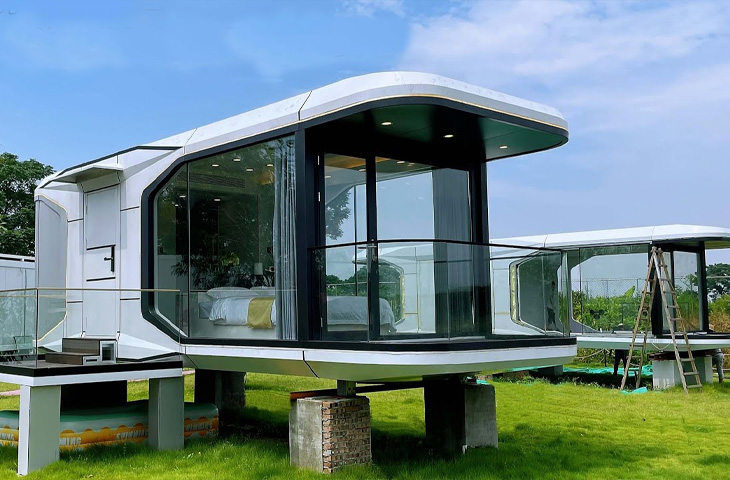Capsule houses are compact, modular living spaces designed to maximize efficiency while minimizing footprint. Their uses have evolved across different industries and settings due to their affordability, portability, and eco-friendliness.
Here’s a more detailed breakdown of how capsule houses are utilized:
Temporary and Emergency Housing
- Disaster Relief: In areas affected by natural disasters (earthquakes, floods, etc.), capsule houses can be quickly deployed to provide temporary shelter. Their portability allows for rapid setup, often requiring minimal infrastructure.
- Construction Site Housing: For workers in construction projects located in remote areas or in cities where accommodations are costly, capsule houses serve as on-site temporary housing, offering basic facilities like beds and bathrooms.
- Homeless Shelters: Cities are experimenting with capsule houses to address homelessness, offering transitional housing that provides privacy and security, compared to traditional shelters.
Vacation and Rental Properties
- Glamping and Eco-Resorts: Capsule houses fit well into the eco-tourism trend, providing a minimalistic yet comfortable lodging experience in natural environments (forests, beaches, mountains). Their small environmental footprint appeals to eco-conscious travelers.
- Short-Term Vacation Rentals: On platforms like Airbnb, capsule homes are used as unique rental properties. Their small size makes them ideal for short-term stays, often attracting people looking for a minimalist or off-grid experience.
Urban Living and Micro-Apartments
- Micro-Apartment Trend: In large cities like New York, Tokyo, or Hong Kong, where space is a premium, capsule houses act as affordable micro-apartments. They provide the essentials — bed, bathroom, and kitchen — while optimizing the use of vertical and horizontal space. Urbanites, young professionals, and students often choose them for their affordability and proximity to city centers.
- Capsule Hotels: Originating in Japan, capsule hotels have small, pod-like sleeping areas. They offer budget travelers a clean, private place to sleep for a fraction of the cost of traditional hotels. The compact space typically includes a bed, small storage, and shared bathroom facilities.
Student Housing
- Dormitories and Campus Housing: Capsule houses are becoming popular as student housing options due to their low cost and efficient use of space. Universities facing housing shortages use capsule structures to build temporary or permanent dorms that cater to students on a tight budget. These units are usually equipped with the basics — bed, desk, storage — with shared common areas.
Workforce Housing
- Remote Workforce Camps: For industries that require workers to live on-site, such as oil, gas, and mining, capsule houses provide a cost-effective and mobile solution for housing employees. They can be quickly assembled in remote areas and dismantled when no longer needed.
- Agricultural and Seasonal Workers: In farming communities, capsule homes are utilized to house seasonal workers during planting or harvest seasons, providing clean, temporary accommodations close to job sites.
Accessory Dwelling Units (ADUs)
- Backyard Guest Houses: Homeowners can install capsule houses in their backyards as guest homes for visitors, providing additional living space without extensive renovations. This also increases property value and offers multi-generational living options (e.g., elderly family members, adult children).
- Home Office or Studio: Capsule houses can serve as standalone workspaces or studios, ideal for remote workers or creatives who need quiet, separate areas from the main house.
Sustainable and Off-Grid Living
- Minimalist Living: Capsule houses appeal to those practicing minimalism and tiny living, prioritizing simple, clutter-free living spaces that reduce material possessions and environmental impact.
- Eco-Friendly Homes: Many capsule homes are designed with sustainability in mind, incorporating energy-efficient materials, solar panels, rainwater collection, and composting toilets. This makes them a popular choice for people looking to live off-grid or reduce their carbon footprint.
Mobile Retail and Pop-Up Stores
- Pop-Up Shops: Capsule homes are increasingly being used by businesses as temporary retail spaces. For example, they can be set up as pop-up stores at events or festivals, offering a mobile and flexible retail solution.
- Offices or Showrooms: Small businesses, startups, or freelancers use capsule homes as affordable office spaces or product showrooms. Their modular design allows them to be easily transported and set up in different locations.
Tourism Industry
- Capsule Hotels: Often found in bustling cities like Tokyo, capsule hotels cater to budget-conscious travelers and those seeking a convenient, no-frills overnight stay. The capsules offer sleeping pods equipped with essentials such as a bed, light, and outlet, while bathrooms and other facilities are shared.
- Eco-Resorts: Capsule houses in resorts provide guests with a unique experience. These compact, minimalist units can be installed in scenic or secluded locations, giving visitors a sense of connection to nature while enjoying the comforts of modern living.
Health and Wellness Retreats
- Meditation Pods: Capsule houses are used in wellness retreats for meditation and relaxation, providing a peaceful, private space where individuals can disconnect from the world and focus on mental health.
- Mobile Therapy Units: In some cases, capsule houses have been adapted into mobile therapy or medical units that can be taken to underserved or rural communities, providing services such as physical therapy, counseling, or medical check-ups.
Advantages of Capsule Houses:
- Affordability: Their low cost makes them accessible for various uses, from temporary housing to urban living solutions.
- Quick Setup: Capsule houses can be assembled rapidly compared to traditional construction, making them ideal for emergency situations or fast-growing housing needs.
- Portability: They can be easily relocated, especially useful for temporary housing, seasonal work, or mobile businesses.
- Eco-Friendly: Many capsule homes are built with sustainable materials and designed to minimize environmental impact, making them attractive to environmentally conscious users.
The adaptability of capsule houses makes them suitable for a variety of residential, commercial, and temporary living needs.
Want to know more about capsule houses. Feel free to contact us anytime!


